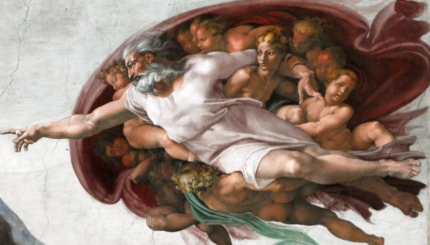Sacred Jewish texts almost always refer to God using masculine imagery and grammar. God is routinely referred to with male metaphors — Father, Lord, King — and with male pronouns. Hebrew being a gendered language, references to God are nearly always conjugated with masculine verbs and pronouns. The standard formulation for a Jewish blessing, Barukh atah adonai (Blessed are you God), uses the male form of you (atah) and refers to God as melekh (king). Some texts even explicitly refer to God as a man, perhaps most famously Exodus 15:3: “God is a man of war.” This is true despite the fact that mainstream Jewish theology does not believe God has a body or a gender.
In recent decades, Jewish feminists have argued that not only is this language inconsistent with the Jewish understanding of what God is (and is not), but it also reifies the second-class status women have long occupied in Jewish life. To rectify this, various alternatives to the way God has been traditionally rendered in text have been proposed. Below are some of the most prominent.
Creative Translations:
The most common approach to dealing with gendered God language in the prayer book is by retranslating it. Rather than revise the well-known blessing formulation, for example, these prayer books offer an English translation with gender-neutral English words. For example, Siddur Lev Shalem, the 2016 Conservative movement prayer book, translates melekh as “sovereign.” Similarly, the 2007 Reform movement prayer book Mishkan T’filah translates melekh as “ruler.” Av harachamim, the opening of a short prayer recited on Shabbat morning that literally translates to “father of mercy,” is rendered as “source of mercy.”
Feminized Renditions:
Alternatively, some have chosen to refigure not just translations but longstanding Hebrew formulations in feminine form. This approach is employed extensively in Siddur Hakohanot, the prayer book associated with the Hebrew priestess movement. For example, the standard blessing formulation is rendered in Siddur Hakohanot as: Brukhah at Shekhinah, eloteinu ruakh ha’olam. Some of the adjustments are purely grammatical, as when the Sabbath eve hymn Shalom Aleichem is rendered as Shalom Aleichen, the second person plural pronoun in the feminine form. Other changes are more substantive, changing melekh to malkah (queen) or adonai (my lord) to Shekhinah (literally “presence”), the term employed by medieval kabbalists to refer to the feminine dimension of God.

Help us keep Jewish knowledge accessible to millions of people around the world.
Your donation to My Jewish Learning fuels endless journeys of Jewish discovery. With your help, My Jewish Learning can continue to provide nonstop opportunities for learning, connection and growth.
Poetic Alternatives:
Rather than merely re-conjugating masculine grammar, some liturgists have gone much further, composing new versions of ancient Jewish prayers to reflect contemporary feminist sensibilities. Among the leading exponents of this approach is the poet Marcia Falk, whose Book of Blessings proposes a number of creative alternatives to standard prayers that largely avoid gendered language entirely. Her blessing over bread, for example, replaces the standard blessing opening with an entirely original alternative: “Let us bless the source of life, who brings forth bread from the earth.” (In Hebrew, the first person plural “let us” is gender-neutral.) Her version of the foundational Shema prayer — which in the original, found in Deuteronomy 6:4, refers to “Lord, our God” — is rendered like this: “Hear O Israel — the divine abounds everywhere and dwells in everything; the many are One.”
Adoption of God Language Alternatives
Orthodox prayer books for the most part continue to translate the text literally, but the liberal movements have overwhelmingly adopted the first approach, retaining the original Hebrew formulations while offering more gender-neutral translations. While some other adjustments to the Hebrew have been made to accommodate contemporary sensibilities — most notably, the addition of the matriarchs beside the patriarchs in the opening of the Amidah prayer — the traditional Hebrew language for God has been left largely intact. Extensive changes to the Hebrew, whether by adopting a feminine conjugation or rewriting them entirely, remains a fringe practice.



